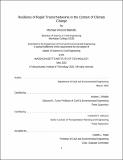| dc.contributor.advisor | Andrew J. Whittle and Frederick P. Salvucci. | en_US |
| dc.contributor.author | Martello, Michael Vincent. | en_US |
| dc.contributor.other | Massachusetts Institute of Technology. Department of Civil and Environmental Engineering. | en_US |
| dc.date.accessioned | 2020-09-15T21:52:31Z | |
| dc.date.available | 2020-09-15T21:52:31Z | |
| dc.date.copyright | 2020 | en_US |
| dc.date.issued | 2020 | en_US |
| dc.identifier.uri | https://hdl.handle.net/1721.1/127329 | |
| dc.description | Thesis: S.M., Massachusetts Institute of Technology, Department of Civil and Environmental Engineering, May, 2020 | en_US |
| dc.description | Cataloged from the official PDF of thesis. | en_US |
| dc.description | Includes bibliographical references (pages 132-144). | en_US |
| dc.description.abstract | Climate change and projected rises in sea level will pose increasing flood risks to coastal cities and infrastructure. This thesis proposes a general framework of engineering resilience for infrastructure systems in the context of climate change and illustrates its application for the rail rapid transit network in Boston. Within this framework, projected coastal flood events are treated as exogenous factors that inform exposure. Endogenous network characteristics are modeled by mapping at-grade tracks, water ingress points, track elevations, crossover switches, and critical dispatch yards to produce a dual network representation of the system, capturing physical and topological characteristics. Contextual aspects of system performance and resilience are considered through the assignment of weights to links based on passenger flows. Resilience is computed assuming a simple linear model of recovery from a flooding event. Using a suite of projected coastal flooding events from the Boston Harbor Flood Risk Model (BH-FRM, 2015) for three future sea level states, the analysis shows increasing vulnerability of the MBTA rail rapid transit network. Based on these results, we develop an adaptation roadmap to protect the MBTA rail rapid transit system against future coastal flooding. The proposed resilience assessment framework can be readily extended to consider more sophisticated performance models, other climate-related events (e.g., extreme rainfall) and additional normative factors, such as equity in public transit. | en_US |
| dc.description.statementofresponsibility | by Michael Vincent Martello. | en_US |
| dc.format.extent | 255 pages | en_US |
| dc.language.iso | eng | en_US |
| dc.publisher | Massachusetts Institute of Technology | en_US |
| dc.rights | MIT theses may be protected by copyright. Please reuse MIT thesis content according to the MIT Libraries Permissions Policy, which is available through the URL provided. | en_US |
| dc.rights.uri | http://dspace.mit.edu/handle/1721.1/7582 | en_US |
| dc.subject | Civil and Environmental Engineering. | en_US |
| dc.title | Resilience of rapid transit networks in the context of climate change | en_US |
| dc.type | Thesis | en_US |
| dc.description.degree | S.M. | en_US |
| dc.contributor.department | Massachusetts Institute of Technology. Department of Civil and Environmental Engineering | en_US |
| dc.identifier.oclc | 1192462153 | en_US |
| dc.description.collection | S.M. Massachusetts Institute of Technology, Department of Civil and Environmental Engineering | en_US |
| dspace.imported | 2020-09-15T21:52:30Z | en_US |
| mit.thesis.degree | Master | en_US |
| mit.thesis.department | CivEng | en_US |
